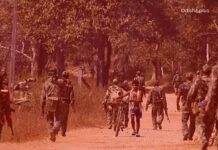OdishaPlus Bureau

The Odisha Police has decided to intensify checks at toll gates and enforce stricter rules for drunk driving, as part of its efforts to reduce road accidents. From Friday, the police have begun conducting breath analyzer tests at all 14 toll gates in the state, DGP B K Sharma stated. A circular to that effect has been sent to all Superintendents of Police.
“Anyone found driving in an inebriated state or under the influence of drugs will be detained. Within two hours of detainment, he will be subjected to a medical test by a registered practitioner. On detection of alcohol beyond 30 mg per 100 ml blood, the accused will be arrested,” the DGP said. Earlier, those failing the breathalyzer test had to pay fines to get off the hook.

The police have decided to act tough on traffic rule violators, especially those found driving in an inebriated state, following a direction by a Supreme Court-appointed committee to reduce accident fatalities in Odisha by at least 10 percent, Sharma said.
According to government records, the state has witnessed nearly 11 percent rise in accident deaths during 2018 when compared to the year before.
The checking of drunken driving at 14 toll gates near Sheragarh, Panikoili, Dhenkikote, Palaspanga, Ramachandrapur, Pipili, Masunikani, Rajgangpur, Tapanga, Langaleswar, Sasan, Attabira, Balichandrapur, and Manguli began from Friday evening using breath analyzers so as to arrest and prosecute the offenders.
The Supreme court has constituted a “Committee on Road Safety” under the Chairmanship of Justice K S Radhakrishnan to monitor all road safety activities taken up by the States. The Committee has directed the State Government to reduce road accident fatality by 10 percent every year.

Drunken driving is believed to be one of the major factors responsible for most of the fatal as well as grievous road accident cases. The Committee has categorically directed to prosecute offenders and convict them as prescribed u/s 185 of the MV Act, 1988 with imprisonment and/or imposition of fine. In compliance with the direction of the Committee, Department of Home has directed the police to invoke legal provisions contemplated u/s 202 and Sec. 203 of MV Act, to curb drunken driving.
While initiating action, concerned SPs have been advised to select police officers carefully for following legal and procedural aspects as per the Criminal Procedure Code and MV Act. Section 185 of the MV Act contains penal provisions for driving by a drunken person or by a person under the influence of drugs.
Whenever any suspected case of drunken driving is committed in presence of a police officer, the Police officer has to detain the vehicle along with the driver/rider and put him to “breathalyze.”
If the alcohol contents exceed 30 mg. per 100 ml. of blood or the drug consumed makes him incapable of exercising proper control over the vehicle, the person concerned shall be arrested. An Arrest Memo shall be prepared by the officer in accordance with the legal provisions enshrined under CrPC.
Within two hours of arrest, the arrestee shall be subjected to a medical test by a registered medical practitioner for the purpose of collection of his blood sample. Where the arrestee is required to provide blood specimen is a female, the specimen shall be taken by a female medical practitioner only or in the presence of a female, whether a medical practitioner or not.

While arresting the offender, the police officer shall take appropriate steps for the temporary disposal of the vehicle. The offender will be arrested on detection of alcohol beyond 30mg. per 100ml. blood. If the arrestee does not furnish required surety/security for bail, he shall be forwarded to the jurisdictional court along with the “Prosecution Report” with the signature of 2 witnesses. Sincere effort must be made to ascertain the correct identity and address/ cell number of the offender. CCTV footages of toll gates recording the checking may be retrieved and produced before the court during the trial, if required.
Police officers have been instructed to facilitate shifting of stranded passengers of detained vehicles by alternative modes of conveyance. They have been advised to show due to courtesy to elderly persons, women, children of such detained vehicles.
Police officers have been strictly instructed to check only drivers suspected of drinking.




























